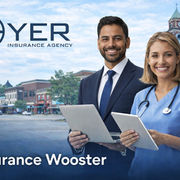Business Insurance Solutions for Wooster Entrepreneurs
- Nov 7, 2025
- 5 min read

Running a business in Wooster, Ohio offers many opportunities—from local retail and small manufacturing to professional services, trades, and home-based ventures. But every business, regardless of size or industry, faces risks that can lead to financial setbacks. Business insurance serves as a protective shield against unexpected events, allowing Wooster entrepreneurs to operate confidently and sustainably.
Understanding the right insurance solutions can help business owners safeguard their assets, employees, operations, and reputation. This guide explores essential business insurance options, why local entrepreneurs need them, and how to build a coverage plan suited to your unique operations. Oyer Insurance Agency strives to help business owners access coverage that supports long-term stability and growth.
Why Business Insurance Matters for Wooster Entrepreneurs
Business insurance is more than a legal or contractual requirement—it is a strategic tool that protects your business from financial loss. Whether you’re a contractor navigating job-site hazards, a retail owner managing daily customer traffic, or a start-up evaluating digital risks, having the proper insurance coverage ensures you’re prepared for the unexpected.
Common risks faced by Wooster businesses include:
Property damage caused by fire, storms, or vandalism
Liability claims from customers or third parties
Workplace injuries
Loss of income due to temporary closure
Cyberattacks or data breaches
Equipment breakdowns
Employee-related claims
Without insurance, even a single incident can result in costly out-of-pocket expenses. Tailored coverage provides financial protection and helps businesses meet regulatory and client requirements.
Essential Business Insurance Solutions in Wooster, Ohio
1. General Liability Insurance
General liability insurance is a foundational policy that every Wooster entrepreneur should consider. It provides coverage for third-party bodily injury, property damage, and legal claims.
For example, if a customer slips in your store or a contractor accidentally damages a client’s property, this policy helps cover medical bills, repair costs, and potential legal expenses. Many vendors and commercial leases require businesses to maintain this coverage.
2. Commercial Property Insurance
Whether you operate from a storefront, office, or home-based workspace, property insurance safeguards physical assets. This includes buildings, equipment, inventory, tools, furniture, and more.
Commercial property insurance protects against:
Fire
Theft
Vandalism
Windstorms
Certain water-related damages
For Wooster businesses that rely on expensive tools or equipment—such as manufacturers, repair shops, and medical offices—this coverage is especially essential.
3. Business Owner’s Policy (BOP)
A Business Owner’s Policy combines general liability and commercial property insurance into a single, cost-effective package. Many small and mid-sized Wooster businesses choose a BOP because it provides broad coverage at a competitive rate.
BOPs can be customized with additional protections such as:
Business interruption coverage
Equipment breakdown
Data breach protection
This makes BOPs an excellent fit for retailers, service providers, and professional services seeking simplified coverage.
4. Workers’ Compensation Insurance
If you have employees in Ohio, workers’ compensation insurance is legally required. This coverage provides financial protection in case an employee is injured on the job, helping pay for medical expenses, lost wages, rehabilitation, and more.
For Wooster entrepreneurs in industries like construction, manufacturing, food service, and agriculture, workers’ compensation plays a vital role in protecting both employees and employers.
5. Commercial Auto Insurance
If your business owns or operates vehicles—such as delivery vans, service trucks, or company cars—commercial auto insurance is essential. It covers vehicle-related accidents, property damage, injuries, and legal claims.
Even personal vehicles used for business purposes may require special coverage, depending on the type of use.
6. Professional Liability (Errors & Omissions) Insurance
Professionals such as consultants, accountants, real estate agents, marketing specialists, and IT providers face risks related to service errors, missed deadlines, or inaccurate advice. Professional liability insurance protects against financial losses stemming from claims of negligence or professional mistakes.
7. Cyber Liability Insurance
Digital risks are increasing for businesses of all sizes. Cyber liability insurance helps businesses recover from events such as:
Data breaches
Cyberattacks
Ransomware incidents
Data theft
System compromises
Wooster businesses that handle customer information, online payments, or digital operations benefit greatly from cyber protection.
8. Business Interruption Insurance
When unexpected events force a business to temporarily close, the loss of income can be devastating. Business interruption insurance helps cover lost revenue, rent, payroll, and operating expenses while the business recovers.
This coverage is particularly valuable for brick-and-mortar businesses and those with consistent daily foot traffic.
9. Equipment Breakdown Insurance
Machinery and equipment failures can interrupt operations and generate costly repair bills. From HVAC systems and refrigeration units to manufacturing machinery and computers, equipment breakdown coverage helps businesses quickly restore operations.
10. Commercial Umbrella Coverage
Commercial umbrella insurance provides an additional layer of liability protection beyond your primary policies. It’s an excellent option for businesses with high liability exposure or those that interact frequently with clients and the public.
Building a Customized Insurance Plan
Every business in Wooster has unique needs, depending on its industry, size, number of employees, and operational risks. A tailored insurance plan ensures that all gaps are covered. Oyer Insurance Agency helps business owners assess risks, evaluate coverage options, and build policies that offer both protection and value.
Important steps include:
Reviewing current operations and assets
Identifying potential risks
Evaluating legal requirements
Comparing policy options
Adjusting coverage as the business grows
A well-planned insurance strategy provides long-term financial protection and peace of mind.
Frequently Asked Questions (FAQ)
1. What types of business insurance are required in Ohio?
Workers’ compensation insurance is required if you have employees. Depending on the business, commercial auto insurance may also be mandatory. Other coverages are optional but strongly recommended.
2. How do I know which insurance policies my business needs?
The best approach is to assess your operations, assets, workforce, and exposure to risks. Working with a knowledgeable agency helps you identify essential coverages and avoid gaps.
3. Are home-based businesses required to have insurance?
Yes. Homeowners insurance rarely covers business liabilities or equipment. Home-based entrepreneurs should consider general liability, property coverage, and professional liability.
4. What is the benefit of a Business Owner’s Policy?
A BOP offers a combination of liability and property coverage at a more affordable rate than purchasing each policy individually. It is ideal for small businesses seeking cost-effective protection.
5. Does my business need cyber insurance?
If you store customer information, accept online payments, or rely on digital systems, cyber insurance is highly recommended. It helps protect against ransomware, data loss, and cyber threats.
6. Can insurance help after temporary business closure?
Yes. Business interruption insurance compensates for lost income and helps cover ongoing expenses until normal operations resume.
7. How often should I review my business insurance policy?
It is best to review policies annually or whenever you expand operations, hire new employees, add equipment, or change your service offerings.



























Comments